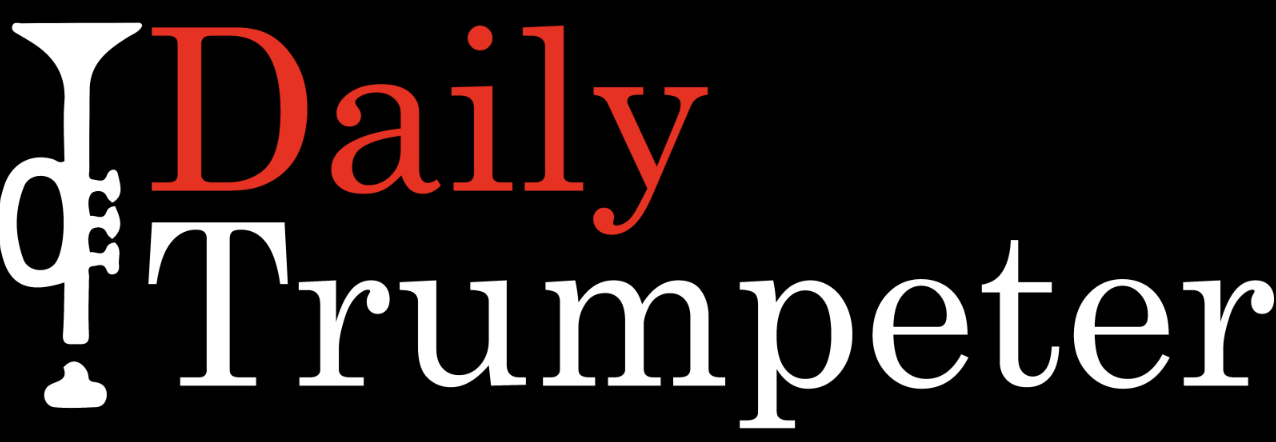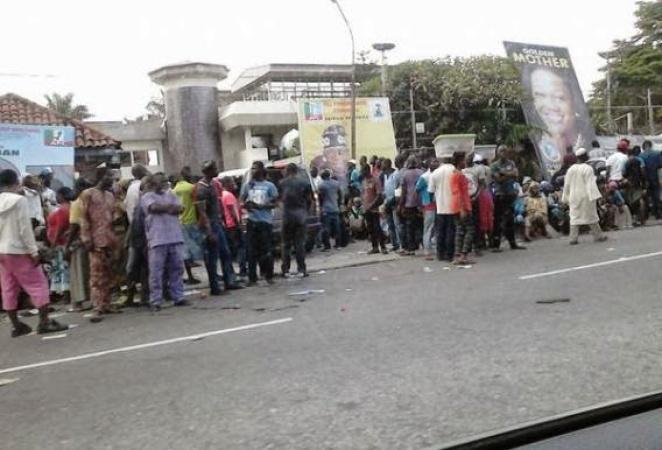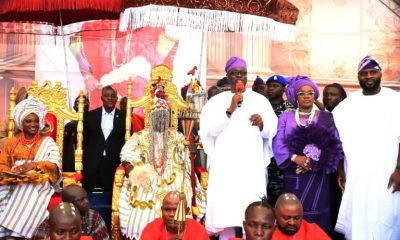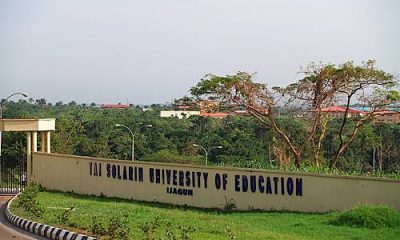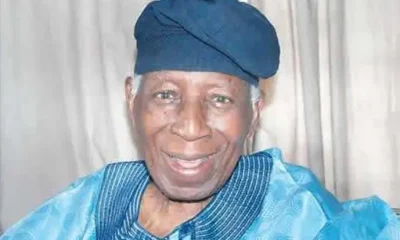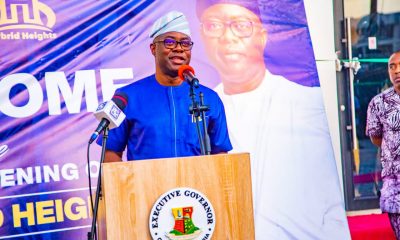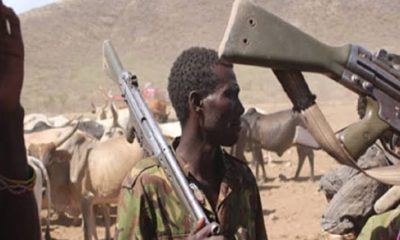Opinion
The eyesore on Bourdillon Road
It has now become something of a yearly tradition that someone would share a video of hundreds, or perhaps even thousands, of beggars lined up on one of the priciest real estates in Nigeria—Bourdillon Road, Ikoyi, Lagos. Already always striking in Nigeria, the paradox of poverty and prosperity jars your eyes. These people queue up for hours, their bodies exposed to weather action accruing the circumstances that will take eventual tow. Usually taken at night, the video displays these panhandlers seeking charity in the unofficial presidential residence.
To be clear, Bourdillon Road is not unique in this respect. I grew up in Ibadan, Oyo State, and the sight of economically challenged people assembling in front of the house of well-to-do Muslims to beg for alms is not exactly rare. If you mingle with them, you will marvel at the complexity of the poverty that will make someone travel—as they claim—a considerable distance to beg. You will be surprised at the distance some of those who resume at Bourdillon have travelled just to fritter away time while expecting the man—or any of his affluent visitors—to extend them some handouts.
People like that come expecting to be given alms because their shared religion with the benefactor stipulates that moneyed people must transfer some income to the poor to maintain the munificence of providence. That explains why wherever you have Islam and poverty, you are guaranteed a nuisance of beggars. That is also why I think FCT Minister Nyesom Wike was wasting time when he started haranguing beggars in the nation’s capital. When religion validates panhandling, you cannot do away with the social tradition it engenders by making a noise. Rich and well-organised Islamic countries do not have this problem for self-evident reasons.
Going by Bola Tinubu’s admission during his recent presidential media chat, it turns out that he has been hosting these professional charity seekers for as long as 25 years! Some of those beggars must be familiar with the street layout and its changing appearance and perhaps have been a fixture there long enough to share a vicarious interest in Bourdillon Road real estate value. They probably do not consider the ungainly sight of themselves hanging around the varnished surface of one of the choicest real estate a blemish but, in fact, as part of the value it carries.
In a society where you can earn social credit through ostentatious performances of charity, the sight of many humans begging an individual for their survival attests to the benefactor’s valour and value. They index his popular support, allowing the man to establish a populist ethos that ultimately shores his political capital. The more the man’s political value rises, the higher the price of items associated with him (including the street he lives). However unseemly the sight of those panhandlers might be, they are part of Tinubu’s wealth and that is probably why he has not thought of doing anything about them. In his media chat, Tinubu sounded as if their besiege of his homestead was an inevitable social reality. It does not look like a tradition that is about to cease.
One would think that after all these years, he should have thought of reorganising the beggars that converge on Bourdillon Road. If people have been crowding your streets for so long, and in that spate of time, you have held leadership positions ranging from governor to the shady title of “governor emeritus”, at what point does it strike you that the sight of suffering humans in front of your house should be considered an eyesore and, therefore, restructured into something more dignifying of humans? Here is a man who has occupied leadership positions for a quarter of a century but refuses to come up with an original idea regarding how to do charity while simultaneously maintaining people’s dignity and public decency.
Rather than having them line up on the streets just so they can be handed a pittance after they have been deemed to have suffered enough, why not establish proper feeding centres in several zones in Lagos, where people can show up at scheduled times to pick whatever welfare items you want to give them? Philanthropy should not require that people be debased before they are fed. We get it, maintaining a crowd feeds your inner Narcissus, but what of the associated risks of that many people standing by the roadside? Then there is the issue of the public resources that would need to be regularly deployed to maintain security around that place. As he is president, security agents must have had to heighten surveillance activities around his house to ensure that mischief-makers do not hide among those beggars. Why the need for that much waste when there are far more efficient ways of doing things? He can redirect the people to the feeding centres where trained personnel will take care of the business smoothly and humanely. If he does not want to run a charity programme all year round, the centres can do it quarterly. What matters is that the “human” is not taken out of humanitarianism.
Looking at that sight, I have also wondered if Tinubu ever spares a thought for his neighbours who invested in real estate only to be forced to endure the nuisance of beggars invading the area, especially around festive periods. Prime real estate as a place like Bourdillon Road claims to be should ideally be typified by an aesthetically pleasing environment. Three factors typically differentiate quality real estate—access (to cultural centres and the added benefit of the nearness of transportation infrastructure such as the airport), appearance (serenity, clean and well-maintained environment, good air quality, etc.) and amenities (from excellent public schools to well-maintained public parks). If you live in a place like Bourdillon Road, the last thing you should ever wake up to see is the endless queue of beggars. Otherwise, what is the point of purchasing luxury?
Beyond his neighbours, there is something about the sight of people hanging around a president’s residence that does not speak well of his leadership capabilities. Maybe no one has nudged him to see it, but the impression that spectacle on Bourdillon Road generates is that Tinubu enjoys the sight of suffering humans and thrives in—and through— their poverty. If all these years, impoverished people hang around you and you remain comfortable enough to keep them just so they can be handed tokens of your large heart, then it means you have a pro-poverty mindset. Such a frame of mind is oriented toward cultivating poverty rather than stimulating abundance. That is why he could unproblematically relate the story of his “friend” who went from using five Rolls Royce to a far-less valued car and not consider the import of the nonsense he was saying. That spurious account was an indication that this is a man for whom poverty—of others, not himself—is an ideal.
If how he thinks this is the way fathers of actual prosperous nations like the United Arab Emirates imagined wealth generation, the country would not be the haven that drives Nigerian leaders to rob people to just to buy their luxury estates. The difference in their respective mindset largely explains why his approach to economic reforms is to first beggarise the nation. His reforms could have been activated with a view toward generating prosperity not a sadistic mentality that relishes seeing someone with five Rolls Royce reduced to nothing, but no. Thanks to his vision, Nigeria now has more beggars, on the streets, social media, public bureaucracies, and corporate offices, likely more than at any time in its history. You can hardly greet people online these days without getting a request from someone begging for money.
Punch
